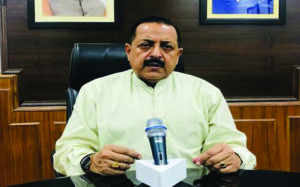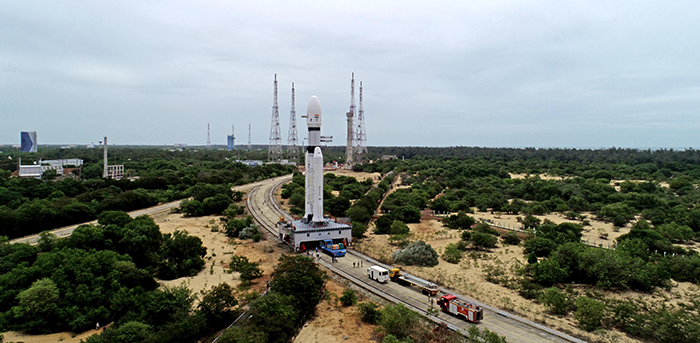NEW DELHI, JULY 9
Chandrayaan-3, scheduled to be launched from Sriharikota this week, will make India the fourth country to land its Spacecraft on the surface of the Moon.
https://twitter.com/chandrayaan_3/status/1677860047798382593?s=20

Stating this here on Sunday in an exclusive interview to a news agency, Union Minister of State (Independent Charge) for Science and Technology, MoS PMO, Department of Atomic Energy, Department of Space, Personnel, Public Grievances and Pensions, Dr Jitendra Singh said that Prime Minister Narendra Modi’s recent USA visit was marked by significant Space related agreements indicating that the countries which had started their Space journey long before India are today looking up to India as an equal collaborator.
https://twitter.com/chandrayaan_3/status/1677891447838867456?s=20
- The Minister says, after such a quantum rise in our Space expertise under Prime Minister Narendra Modi’s regime, India can no longer wait to be left behind in its march to the Moon
- Chandrayaan-3 is aimed to demonstrate India’s capability in soft landing and roving on the surface of the Moon or the Lunar surface: Dr Jitendra Singh
- India’s space start-ups exploring niche markets, global collaborations
After such a quantum rise in our Space expertise under Prime Minister Narendra Modi’s regime, India can no longer wait to be left behind in its march to the Moon, the Minister said.
“Prime Minister Narendra Modi broke the taboos of the past, and unlocked space technology to the private sector. Within three years we have more than 150 start-ups, some of them first of its kind. It is being acknowledged on world parameters,” Union Minister for Science and Technology Jitendra Singh said.
He said the US now considers India as an equal collaborator in the space sector, which is in contrast to what was 50 years ago when every country looked towards the US for cues in the space sector.
From aiming to re-fuel satellites in orbit to monitoring the Earth’s health, Indian start-ups in the space sector are exploring niche markets with the hope of striking it big as opportunities for global commercial collaborations open up.
India becoming a signatory to the Artemis Accords and the focus on the space sector, particularly on addressing issues related to export control and technology transfer, during Prime Minister Narendra Modi’s recent visit to the US will open up doors for private players, industry leaders believe.
“It is a good start, because it was unheard of for the US to supply any space or defence-related technology 10-15 years ago. It was a taboo. Now, we are talking of working together in sunrise sectors,” Manastu Space co-founder Tushar Jadhav said.
Mumbai-based Manastu is developing green propulsion systems for satellites and hopes to validate its technology during a test flight in the coming year. It is also designing a fuel station in space to provide in-orbit refuelling service for satellites which otherwise have to be abandoned after the on-board fuel is exhausted.
Director General, Indian Space Association, Lt Gen A K Bhatt (retd), said, “Many technologies in the space sector are dual use technologies, but this is an indication that now there will be easing of processes for this.”
In November last year, Hyderabad-based Skyroot Aerospace wrote its name in spacefaring history with the successful launch of its Vikram-S rocket, the first privately built space rocket in India, within four years of its founding.
The company, founded by former scientists and engineers from ISRO, is now developing three variants of the Vikram series of rockets to put small satellites in orbit.
“The kind of work that is being done by the private sector is not replicating what ISRO has done. The launch vehicles developed by Skyroot and Agnikul have their own uniqueness. The satellite applications are very niche and cutting edge in terms of technology,” Indian National Space Promotion and Authorisation Centre (IN-SPACe) chairman Pawan Goenka said.
Last year, Chennai-based Agnikul Cosmos inaugurated its own launchpad within the Satish Dhawan Space Centre at Sriharikota, from where ISRO carries out its space launches.
Since the demand for space technology and space data is very low in India, domestic private players are exploring global markets for their products.
“They are beginning to see some successes. Getting some orders from government agencies. That’s another big thing that is happening,” Goenka said, referring to the five-year contract Bengaluru-based Pixxel bagged from the US National Reconnaissance Office for supply of hyper-spectral imagery from its satellites.
The space economy in India is very small accounting for approximately 2.1 per cent of the global space economy in 2020 amounting to USD 9.6 billion, which was 0.4 per cent of the Gross Domestic Product (GDP) in the country.












